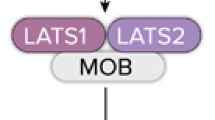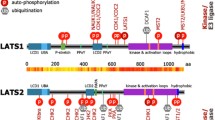Forkhead transcription factors: new insights into protein kinase B (c-akt) signaling (original) (raw)
- 300 Accesses
- 251 Citations
- Explore all metrics
Abstract.
The proto-oncogene protein kinase B (PKB), also known as c-Akt, is a central player in a signaling pathway of which many components have been linked to tumorigenesis. Active forms of PKB as well as of its upstream activator phosphatidylinositol 3-kinase (PI3K) have been found to be responsible for the transforming activities of certain viruses, and the negative regulator of this pathway, PTEN, is a tumor suppressor. The identification of particular downstream targets of PKB has provided us with new insights into the possible mechanism of PI3K/PKB-mediated tumorigenicity. Recently a subfamily of Forkhead transcription factors was identified as additional targets for PI3K/PKB signaling. This review discusses the studies that have led to this conclusion and the possible implications of this finding for our understanding of how PI3K/PKB activity could lead to oncogenesis.
Access this article
Subscribe and save
- Get 10 units per month
- Download Article/Chapter or eBook
- 1 Unit = 1 Article or 1 Chapter
- Cancel anytime Subscribe now
Buy Now
Price excludes VAT (USA)
Tax calculation will be finalised during checkout.
Instant access to the full article PDF.
Similar content being viewed by others

p53 shades of Hippo
Article 06 October 2017

Author information
Authors and Affiliations
- Laboratory for Physiological Chemistry and Center for Biomedical Genetics, University of Utrecht, Universiteitsweg 100, 3584 CG Utrecht, The Netherlands
Geert J.P.L. Kops & Boudewijn M.T. Burgering
Authors
- Geert J.P.L. Kops
You can also search for this author inPubMed Google Scholar - Boudewijn M.T. Burgering
You can also search for this author inPubMed Google Scholar
Additional information
Electronic Publication
Rights and permissions
About this article
Cite this article
Kops, G., Burgering, B. Forkhead transcription factors: new insights into protein kinase B (c-akt) signaling.J Mol Med 77, 656–665 (1999). https://doi.org/10.1007/s001099900050
- Received: 19 July 1999
- Accepted: 06 September 1999
- Published: 23 September 1999
- Issue Date: September 1999
- DOI: https://doi.org/10.1007/s001099900050
